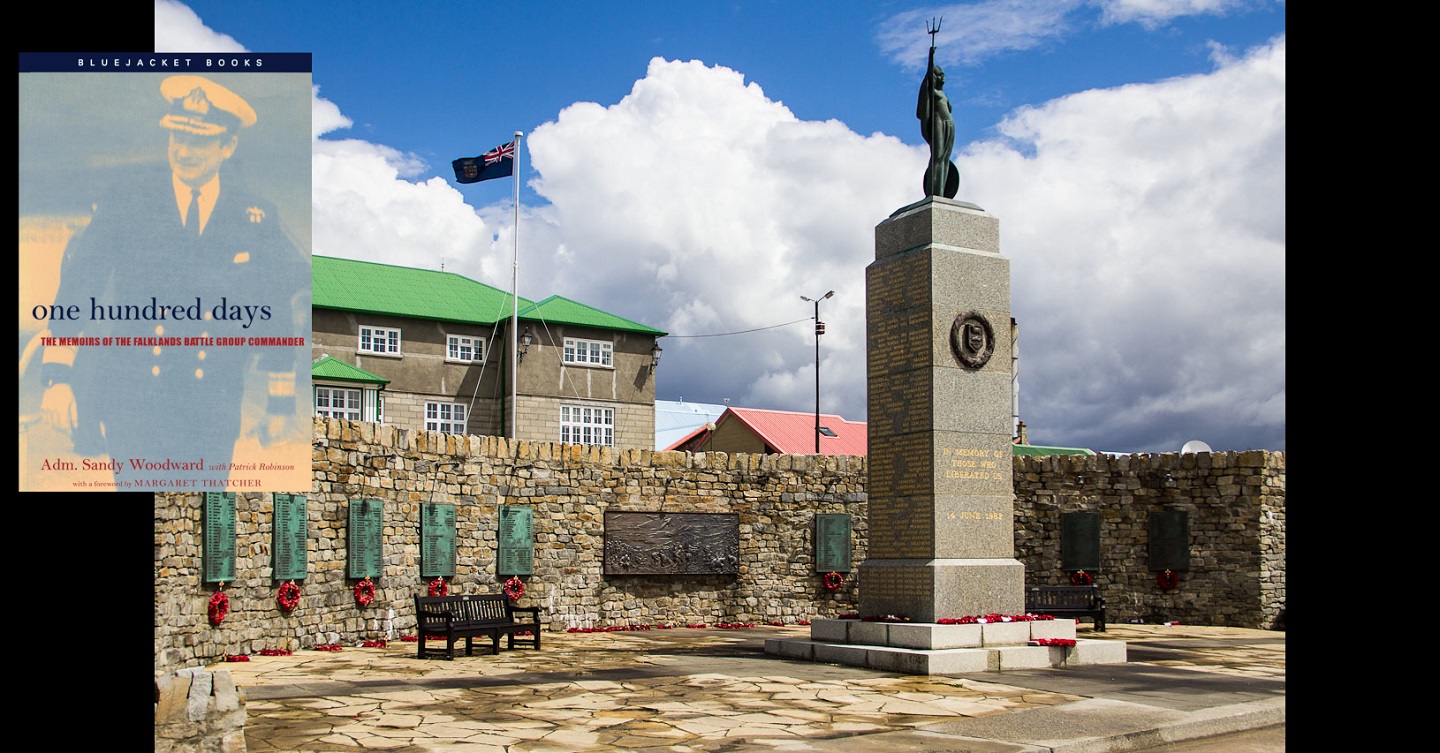
In the tradition and style of Ulysses S. Grant’s Memoirs, Woodward’s One Hundred Days: The Memoirs of the Falklands Battle Group Commander is refreshingly clear, honest, and self-critical.
British military historian and war correspondent Max Hastings famously referred to the Falklands War as “a freak of history.” In this environment, he wrote, “many of those taking part felt as if they had been swept away into fantasy, that the ships sinking and the guns firing around them had somehow escaped from a television screen in the living room.” (Hastings vii)
This sharp but short war, nearly forgotten in the United States, produced a plethora of memoirs, unit histories, and campaign analyses. However, the best of the bunch was written by the Royal Navy force commander, Admiral Sandy Woodward. In the tradition and style of Ulysses S. Grant’s Memoirs, Woodward’s One Hundred Days: The Memoirs of the Falklands Battle Group Commander is refreshingly clear, honest, and self-critical. One Hundred Days offers unique insights into the burdens of multi-domain operations against a modern adversary with advanced – if not quite peer – capabilities in the sea, air, and land domains. This work off the “dusty shelf” represents a helpful antidote to habits engrained during sustained land operations against capable but irregular foes in Iraq, Afghanistan, and elsewhere in the post 9/11 wars.
The Burdens of Command in Modern War
On April 2nd 1982, Argentine forces invaded the Falkland islands (also known as las Islas Malvinas), a British overseas territory located over 8,000 miles from the British isles but only 300 miles off the coast of southern Argentina. Through this effort, Argentina’s military junta sought to fulfil a long-standing claim to the islands and to rally domestic support amidst popular criticism of the regime’s economic mismanagement.
Faced with this fait accompli, Prime Minister Margaret Thatcher’s government rapidly assembled and dispatched Admiral Woodward’s task force to the region. After a period of intense, but ultimately unsuccessful, diplomatic activity to resolve the conflict, Thatcher ordered Woodward to re-capture the islands. After a 100-day campaign that witnessed fierce fighting on the sea, below the sea, in the air, and on the ground, British forces restored the Union Jack to Port Stanley, the capital of the Falklands.
Over the course of those eventful months, death often arrived suddenly from platforms that could be hundreds or even thousands of kilometers away. One Hundred Days is a deeply honest portrait of the burdens of command under these conditions. Woodward combined his latter-day insights with his contemporary journal entries, offering the reader a rare glimpse to the strains, frustrations, and small triumphs of command. The reader senses the author’s anguish and burden as he ordered his ships and men into exposed positions.
In one such instance, due to an absence of minesweepers, Woodward ordered the HMS Alacrity, a destroyer, to clear the channel between West and East Falklands, including the eventual location of the Task Force’s landing site at San Carlos Bay. With typical British understatement, Alacrity’s commander responded that “I expect you would like me to go in and out of the north entrance a few times Admiral…to find out whether there are any mines there.”
While the Alacrity emerged unscathed from this risky venture, Woodward’s Task Force ultimately lost 87 men, two destroyers, two frigates, a large container ship, ten Harrier fighter jets, and 24 helicopters by the war’s conclusion. The reader senses Woodward’s pain at these losses – which emerged suddenly, as Exocet missiles and bombs slammed into ships. Casualty reports, never an easy thing to receive in any circumstance, arrived in Woodward’s war room in grim dozens.
One Hundred Days offers valuable insights on leadership as Woodward navigated these challenges. He struggled with the question of “how much is enough” in his own direct management of operations. As a submariner, Woodward proved, both by temperament and training, deferential to the judgement of his on-scene commanders and ship captains. For example, he delegated authority for managing the close-in amphibious operations to his deputy and rarely interfered in the conduct of the land invasion. However, at times, Woodward correctly overruled the advice of his most specialized advisors. In one such occasion, Admiral Woodward insisted that his Special Air Service (SAS) contingent conduct only five days of reconnaissance in preparation for a raid on an Argentine airfield, versus the thirty days his SAS liaison recommended as necessary for mission success. For Admiral Woodward, the risk to the fleet from the continued operation of the Argentine airfield, to say nothing of the possible delays to the main amphibious landing, outweighed the risk to the SAS Squadron leading the raid. The SAS ultimately conducted the operation on the condensed timeline Woodward demanded and successfully destroyed eleven Argentine aircraft on the ground.
Admiral Woodward faced constant trade-offs and balanced perilous risks between domains.
Lessons for Land Forces in Multi-Domain Operations
For Army leaders, Woodward’s book provides valuable appreciation for naval prerogatives and perspectives. Admiral Woodward faced constant trade-offs and balanced perilous risks between domains. During the initial landing at San Carlos Bay, Woodward deployed his destroyers and frigates in vulnerable “bomb alley,” the channel between East and West Falklands, to protect the nascent landings from air attacks. This decision cost Woodward two destroyers, but enabled the land forces to establish an uncontested foothold. In another instance, he brought The Atlantic Conveyor, a transport ship packed with ammunition and helicopters, forward alongside his carriers during daylight hours in order to give the crews more time to unload their land-bound cargos under the cover of darkness. However, this decision backfired, as Argentine air-launched Exocet missiles sank the undefended transport in an attempt to hit Woodward’s precious carriers.
In turn, Woodward depended on his land forces to establish their own air defense bubble quickly, and to complete the ground campaign before winter conditions and extended time at sea decimated his battered force. British ground forces disappointed Woodward on both accounts. Much like his ships’ own air defense systems, British land-based air defense systems underperformed badly. The glacial pace of the land campaign also dismayed Woodward. Bereft of troop-transport helicopters after the sinking of Atlantic Conveyor, the ground campaign across the 60-plus miles from the beaches at San Carlos to Port Stanley proved to be a tough, physical slog.
In modern multi-domain operations, ground force commanders must appreciate the pressures on the naval component and assume risks of their own – risks that they would surely avoid in a continental campaign. Just as the naval component must assume risk during vulnerable moments of landing operations, land forces must assume risk to quickly establish organic air defense capabilities. At times, land forces must also be prepared to assume hazards, such as operating beyond artillery support or with minimal ammunition stocks, that would be categorically dismissed in other circumstances. At the very least, ground force commanders must be prepared to operate independent of sea-projected support – from air cover to fire support to medical evacuation – for prolonged periods. This unraveling of naval support may come suddenly, and utterly without warning, as the fleet reacts to emerging threats.
Conclusion
Much has changed since 1982. The geometry of conflict has only expanded with the advent of long-range precision strike systems. While the threat of a handful of air-launched Exocet missiles dictated the deployment and position of Admiral Woodward’s fleet, modern naval forces must account for hundreds of such missiles launched from land, sea, and air platforms. Persistent reconnaissance, through unmanned aircraft and space-based systems, may dissipate some of the fog of war that so bedeviled Woodward. Nevertheless, if one is looking for a dusty book off the shelf to orient the mind to the harsh realities of contemporary multi-domain operations, One Hundred Days represents an excellent starting point.
Major Sam Wilkins is a U.S. Army Special Forces officer with deployments to Somalia, Nigeria, and Afghanistan. Sam holds an M.A. in International Affairs from Johns Hopkins School of Advanced International Studies and is a Shawn Brimley Next Generation Security Fellow with the Center for a New American Security.
The views expressed in this article are those of the author and do not necessarily reflect those of the U.S. Army War College, the U.S. Army, or the Department of Defense.
Photo Description: The 1982 Liberation Memorial is a war memorial in Stanley, Falkland Islands. It commemorates all British Forces and supporting units that served in the Falklands War and helped liberate the Falkland Islanders from Argentine military occupation in 1982. The Memorial is situated in front of the Secretariat Building, overlooking Stanley Harbour.
Photo Credit: Alex Petrenko via Wikimedia Commons





What a great review and thank you for broadening my Falklands War reading list.
I think the Falklands Campaign is an excellent case study to introduce Company and Field Grade Officers to Expeditionary Logistics at the Strategic and Operational levels. I taught an OPD series on this for seelected 1LTs and CPTs (MS, VC, TC, QM, OD and LG) last year at Camp Arifjan, Kuwait and used MG Kenneth Privratsky’s great book,. “Logistics in the Falklands War” as our text.
The Army Press’ LSCO series also discusses the operational logistics behind this campaign in its Sustainment volume. I highly recommend that 20-30 page introduction as a first start for those unfamiliar with the Falklands War before diving into Admiral Woodward’s memoirs.
The Falklands Campaign was simply remarkable as Stanley is further away from London than Tokyo. The timing of the Argentinian invasion in 1982 was fortuitous as the UK would have likely been able to retake the islands in 1983 due to the planned divestment of sealift and theater logistics capabilities.
I wanted to visit this April for the 40th anniversary commemoration, but the Falklands Government has instituted very stringent travel restrictions due to COVID.
What a great review and thank you for broadening my Falklands War reading list.
I think the Falklands Campaign is an excellent case study to introduce Company and Field Grade Officers to Expeditionary Logistics at the Strategic and Operational levels. I taught an OPD series on this for seelected 1LTs and CPTs (MS, VC, TC, QM, OD and LG) last year at Camp Arifjan, Kuwait and used MG Kenneth Privratsky’s great book,. “Logistics in the Falklands War” as our text.
The Army Press’ LSCO series also discusses the operational logistics behind this campaign in its Sustainment volume. I highly recommend that 20-30 page introduction as a first start for those unfamiliar with the Falklands War before diving into Admiral Woodward’s memoirs.
The Falklands Campaign was simply remarkable as Stanley is further away from London than Tokyo. The timing of the Argentinian invasion in 1982 was fortuitous as the UK would have likely been able to retake the islands in 1983 due to the planned divestment of sealift and theater logistics capabilities.
I wanted to visit this April for the 40th anniversary commemoration, but the Falklands Government has instituted very stringent travel restrictions due to COVID.